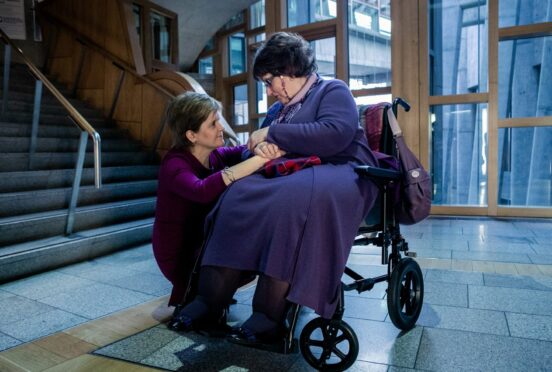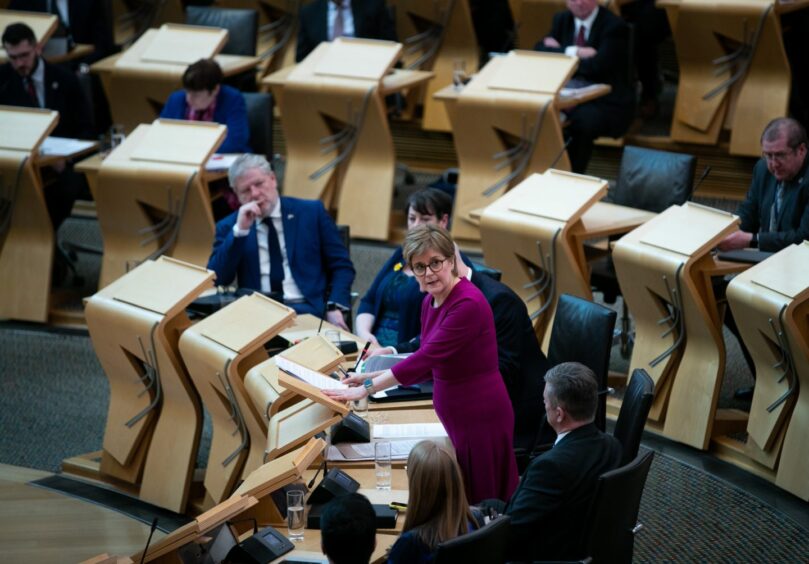
On the first anniversary of the forced adoption apology, we can reveal mothers and children taken during Scotland’s stolen babies scandal are set to launch legal action.
Legal experts say that, with up to 120,000 mothers and babies torn apart simply because the women were not married, the case is set to be one of the biggest human rights abuse cases the country has seen.
Mothers and adoptees from Forced Adoption Scotland have been meeting with lawyers over the scandal, which left women and their children separated and traumatised for life.
A year ago, Scotland’s former first minister Nicola Sturgeon made a full apology for forced adoption and the dreadful practices that took place across Scotland from the 1950s until the late-70s in mother and baby homes run by councils, religious organisations and charities.
But campaigners say that, since then, they have had virtually no contact with the Scottish Government, which has failed to provide specialist support and victim-led policies.
‘A right to redress’
Scotland’s top mass litigation expert, solicitor advocate Patrick McGuire, said last night specialist teams at Thompsons Solicitors and Quantum Claims have been working with KCs to act on behalf of the mothers and their “stolen” children.
McGuire said: “What happened to these women and their children has to be one of the worst human rights abuses of our time. The dreadful consequences and effects of what was done to them are overwhelmingly in evidence today, despite the length of time that has passed.
“At the very least we believe they have a right to justice and compensation for the life-changing abuses imposed upon them. We believe they have a right to redress.
“And we are investigating the multi-generational side effects of the drugs given to these vulnerable young women with a view to taking legal action on their behalf.”
Many forced adoption mothers have already passed away without any justice for the scandal that tore apart their lives. Lawyers are examining ways remaining family members may possibly claim.
McGuire said: “It is of greatest sadness many mothers have already passed away, but we are looking to see if there is a way for their surviving family to take action on their behalf.
“While there are obvious complexities and difficulties because of the length of time that has passed, we are confident of robust action.
“It is helpful to see action being taken over redress and compensation in other countries where these same awful practices were prevalent.”
Some Australian states are currently considering redress, 12 years after delivering the first forced adoption apology in the world.
The state of Victoria is establishing a £100 million redress scheme, with £30,000 for individuals as well as access to specialist support and counselling services.
Forced adoption victims in Scotland have received cross-party support from MSPs for redress.
Despite the former first minister’s apology for practices she described as “almost impossible to comprehend”, the Scottish Government has come under repeated fire for failing to provide specialist support and victim-led policies.
Sturgeon also delivered the world’s first formal apology to the forced adoption mothers given the drug Diethylstilbestrol, also known as DES, to dry up their breast milk so their babies could be taken for adoption quickly. But the synthetic female oestrogen hormone has since been found to cause rare cancers and mutations to reproductive organs in the children and grandchildren of those exposed to the drug.
Major awards have been made in countries such as the US and in Europe, with claimants forced to sign non-disclosure agreements to keep amounts secret. Politicians here have called for an awareness campaign to alert families to the possible risks, but say the Scottish Government has failed to answer questions over what steps it has taken to warn the public.
The Scottish Government said: “Medicine licensing is the responsibility of the UK Government and any redress scheme on Stilbestrol would ultimately be a matter for them to consider.”
Scottish Government’s response has been amateurish and inadequate
Forced adoption campaigner Marion McMillan, 74, was in parliament last March when the then first minister, Nicola Sturgeon, made her landmark apology.
Afterwards, Sturgeon pushed wheelchair-bound Marion to a special reception for survivors.
Since then, Marion says she has had very little contact from the Scottish Government.
She said: “Despite being Scotland’s foremost campaigner and battling for over 50 years to have the shameful forced adoption abuses acknowledged, I have had little or no positive contact with officials.
She said: “We were sentenced to a living bereavement, never knowing where our children were, or if they were safe and well.
“The shame and fear imposed upon us ensured we kept Scotland’s dirty little secret and never spoke about what was done to us.
“Many women were so traumatised and damaged they found it impossible to talk about the babies taken from them.
“We were silenced, ordered never to try to find our babies or face years in jail.”
Marion says mothers were treated dreadfully, often denied painkillers during birth and refused access to even hold their babies before they were taken.
She said she suffered “traumatic birth injuries when my baby was literally torn from me. I was told that would teach me a lesson not to have sex again until I was married. I spent the rest of my life with physical and psychological injuries which will never heal.”
Scotland’s oldest adoptee, Marjorie White, 73, from Edinburgh, has also struggled to engage officials.
She said: “I have tried my best to speak to officials to impress upon them the very specific and unique victim-centred support we desperately need, and the government response has been nothing short of amateurish and inadequate.
“We have little choice now but to pursue legal action and ensure we get the help we need to come to terms with what was done to us.
“Our lives have been lived in silence and pain. But this was a burden which never should have been placed upon our shoulders.
“When I eventually found out that I had been adopted, I tried to find my natural parents.
“Instead of helping, the authorities who were responsible for what was done to me placed every obstacle possible in my way for so long that it cost me the opportunity to meet my father.
“He died in Australia as we were planning to get together.
“The sense of loss and betrayal will always haunt me.
“People need to understand that the practises which prevented me finding my mother and father continued in the ’90s.
“It was unbelievably cruel. I only got four years with my natural mother, and never got a chance to hug my own father.”

Enjoy the convenience of having The Sunday Post delivered as a digital ePaper straight to your smartphone, tablet or computer.
Subscribe for only £5.49 a month and enjoy all the benefits of the printed paper as a digital replica.
Subscribe © Andrew Cawley
© Andrew Cawley